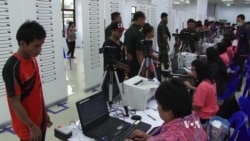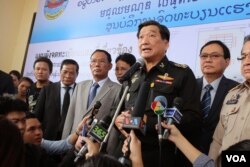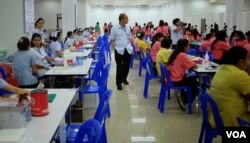The chief of staff of Thailand's army showed up on opening day at a new "one stop" center that documents foreign laborers.
The high-profile visit demonstrates the importance the country's military junta attaches to combating human trafficking.
Thailand has been branded one of the worst global offenders when it comes to forced or exploited labor. The kingdom is trying to clean up its image while retaining the migrant workers who are valuable to its economy.
About 2,000 people, mostly from Myanmar, were photographed, fingerprinted and X-rayed, and gave urine and blood samples at the center in Samut Sakhon. In exchange, they received a temporary labor identification card. If they pass the background and medical checks, they will be certified to continue working in Thailand.
An estimated 200,000 Cambodians have fled Thailand since the May 22 coup, fearing a crackdown on all foreign labor, legal or undocumented.
The junta blames the panicked exodus on corrupt Thai officials spreading rumors so they could extract payoffs from the Cambodians when they eventually returned.
Army chief of staff General Sirichai Distakul calls it all a big cross-border misunderstanding.
“We’ve allowed some of them to return [without passports] because entrepreneurs will have trouble running their businesses if these workers are not here,” he said.
Construction worker Sam Phai was among the minority of Cambodians who did not flee.
“I didn’t want to return home. I knew it would be very difficult to return here if I did," he said. "I want to continue working here. My employer told me that I could stay in Thailand if I get this new card. That will allow my boss to prevent the police from taking me away if there is a raid.”
The expectation is that this new system, in military fashion, will instill order and honesty. Immigration officials tell VOA they expect to convert 90 percent of the undocumented foreign laborers in Thailand to legal status.
“On the whole, if we follow the process, there will be no corruption," said Athit Boonyasopat, governor of Samut Sakhon. "At the provincial level, we’re adhering to the policy set by the National Council for Peace and Order [military junta]. It’s quite transparent.”
Myint Aung, who is from Rakhine state in Myanmar and has been working on construction projects in Thailand for two years, has high hopes for the new system.
“The old system was corrupt," Myint Aung said. "We had to rely on brokers to get us identification cards. But the police would still shake us down for bribes when we showed the card. I heard the new ID card will be more helpful and secure.”
Another incentive for utilizing the new system: an amnesty for undocumented workers who register and no punishment for their employers who bring them to the one-stop centers.










